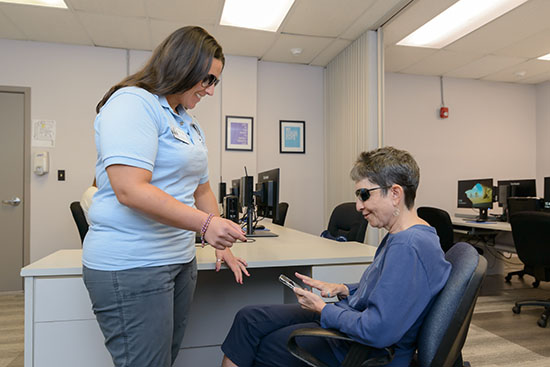 Assistive Technology training enables individuals who are blind or visually impaired to use computer technology in the home, school, and workplace. Instruction is based on the individual goals of every client and includes training on access software, which helps the user on Windows and Apple operating systems navigate, read & write e-mails, browse the Internet. Additional training on specialized assistive technology devices such as braille notetakers, refreshable braille displays, and scanners is also available. The skills learned from assistive technology training also assist with maintaining a competitive edge in today’s job market. Training is held in the Lighthouse of Broward computer lab, remotely over the phone, or at your job site.
Assistive Technology training enables individuals who are blind or visually impaired to use computer technology in the home, school, and workplace. Instruction is based on the individual goals of every client and includes training on access software, which helps the user on Windows and Apple operating systems navigate, read & write e-mails, browse the Internet. Additional training on specialized assistive technology devices such as braille notetakers, refreshable braille displays, and scanners is also available. The skills learned from assistive technology training also assist with maintaining a competitive edge in today’s job market. Training is held in the Lighthouse of Broward computer lab, remotely over the phone, or at your job site.
In order to begin assistive technology training using a computer, keyboarding instruction is offered so that the client learns to touch-type. The ability to type accurately is extremely important when using assistive technology software, as the keyboard is the primary means of accessing the computer. Once keyboarding instruction is completed, training is offered in more advanced skills, including word processing, email, and use of the Internet using assistive technology is available, depending on the goals of the client.
Mobile device training is also available through Lighthouse of Broward’s Assistive Technology classes. Applications are available in some mobile devices, including the iPhone, iPad, and Android that offer accessibility for persons with visual impairments and blindness. Tasks such as identifying currency denominations, color, text, and much more are available at your fingertips, and instruction on how to use these applications is taught through assistive technology courses.
Basic skills learned through assistive technology training using a computer include:
 General navigation of a computer
General navigation of a computer
- Use and adjusting the settings of screen reader or magnifier software
- Word processing
- Organizing and managing files
- Browsing the Internet
Advanced skills can include:
- Advanced word processing
- Spreadsheets
- Presentations
Many of the objectives above are included in mobile device training, also:
- Making and receiving phone calls
- Texting
- Using gestures
- Utilizing voice assistants
- Exploring and downloading helpful apps

